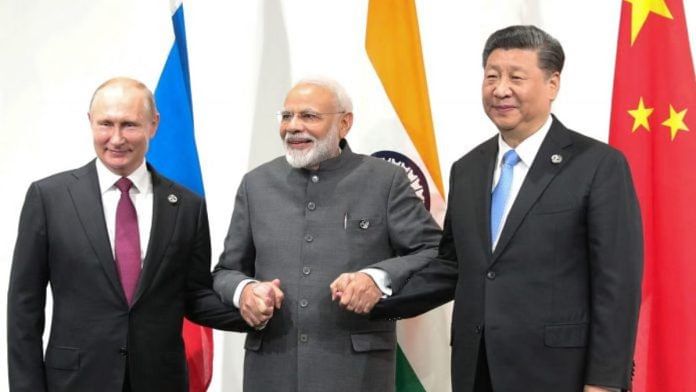Thank you dear subscribers, we are overwhelmed with your response.
Your Turn is a unique section from ThePrint featuring points of view from its subscribers. If you are a subscriber, have a point of view, please send it to us. If not, do subscribe here: https://theprint.in/subscribe/
That’s exactly what happened last week when U.S. President Donald Trump—back in office with the grace of a wrecking ball—slapped a 50% tariff on Indian exports. Our “crime”? Buying oil from Russia. Imagine that: a sovereign nation shopping for energy where it suits its interest—punished by a country that itself quietly buys uranium hexafluoride, titanium, palladium, and rocket-grade aluminium from Moscow.
Welcome to the theatre of Western hypocrisy, where “rules” mean “do as I say, not as I do,” and “freedom” comes with a footnote: only if you bend the knee.
But here’s the silver lining: this tantrum is a gift. It’s time India stopped playing the polite last guest at the G7 cocktail party and started hosting its own banquet.
My Enemy’s Enemy is My Friend
The oldest diplomatic truth is suddenly the most relevant: your enemy’s enemy can be your greatest asset. With the U.S. exposing its double standards—selective morality, transactional loyalty, economic blackmail—it’s time India courts the unthinkable: a hard-nosed strategic embrace with China and Russia.
Yes, there’s history with China. Yes, there are border issues. But history is not strategy, and foreign policy cannot be run like a grudge diary.
If Modi can shake hands with Biden, Xi, and Putin in the same month, he can certainly shake up the global chessboard. And there’s no better moment—when the West is openly weaponizing interdependence—to rewrite the rules entirely.
Enter: The World’s New Power Bloc
If India, China, and Russia—along with Iran, Brazil, and South Africa—form a strategic pact, we won’t be a “counterweight” to the West. We’ll be the centre of gravity:
- Population: 3.2 billion — nearly half the planet
- GDP (PPP): > USD 60 trillion, already snapping at the West’s heels
- By 2035: set to overtake the U.S. and EU combined
- Armed Forces: largest military bloc on Earth
- Resources: enough to feed, fuel, and electrify the planet
Why beg for a seat at their table when we can build our own—and own the forest it’s carved from?
CORE: The Mineral Scepter
At the heart of this bloc must be CORE — the Consortium for Organizing Rare Elements.
This is our OPEC for the 21st century—only stronger, because it controls the very DNA of modern technology: rare earths, lithium, cobalt, thorium, palladium, uranium.
Let the West try making EVs, satellites, hypersonic missiles, or AI supercomputers without these. Let them try running a defense industry without what lies in our soil. Good luck.
China already dominates over 60% of rare earths. India has the third-largest reserves. Russia rules uranium enrichment. One coordinated export policy, and the West’s supply chains go from “just in time” to “not anytime soon.”
CORE must:
- Set global mineral pricing benchmarks
- Use dual pricing — one for friends, a premium for those who threaten us
- Launch a Rare Earths Exchange in rupee, ruble, yuan, or gold
- Tie access to technology transfers, not morality sermons
Modi’s Moment
Modi’s energy sovereignty stance is exactly what this moment demands. He didn’t flinch when the U.S. tried to strong-arm us off Russian oil. He didn’t grandstand when Canada became a clubhouse for separatists.
He stood firm. Now, he must go further—host a Xi-Putin-Modi summit to redraw the power map.
Let the West gasp. Let think tanks hyperventilate. Let editorials mourn the “end of the liberal order.” It was never liberal—and we were never invited.
The End of Guilt Diplomacy
For too long, India has played the “responsible democracy” — forever deferential, forever cautious. What did that buy us? Tariffs. Sanctions threats. CAATSA waivers. Visa crackdowns. No UNSC seat. No Kashmir support. Enough.
We don’t need the West to sign our permission slips. We need partners who grasp strategic autonomy—not ones who dress up trade deals as moral crusades.
Let the Balance Shift
The U.S. empire rests on controlling finance, tech, and resources. Empires rarely fall with bullets—they crumble when supply chains and alliances shift.
If oil was the 20th-century weapon, rare earths will be the 21st. And if the West insists on swinging its economic club, it’s time we picked up the mineral scepter.
India, China, and Russia don’t need to ask.
They need to act.
And Modi may be the man to light the fuse.
Mohan Murti
Advocate & International Industry Arbitrator
Former Managing Director-Europe
Reliance Industries Ltd.
Member of Supervisory Board
Innoplexus AG, Germany
These pieces are being published as they have been received – they have not been edited/fact-checked by ThePrint.


